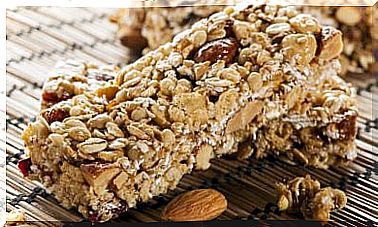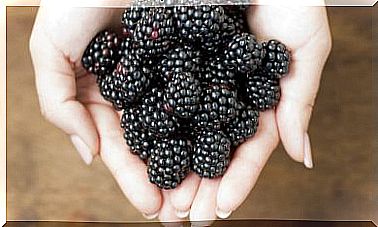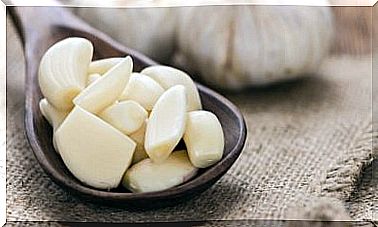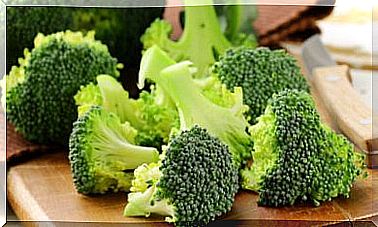Medicinal Properties Of Cassava Or Cassava
Cassava, also known as cassava, is an important food in the diet of tropical countries. It is present in most traditional recipes, as it is valued for its versatility and nutritional quality. What are its medicinal properties?
As with other foods, the consumption of cassava contributes to obtaining nutrients that are essential for health. Of course, this as long as it is included in a healthy eating plan. We will detail more about it below.
What is there to know about cassava?
Just as in Asia the lower classes consume rice, and in the West wheat is part of the basic diet of households, in South and Central America cassava is one of the main ingredients of the daily diet.
Cassava is a tuber whose scientific name is Manihot esculenta. It corresponds to the underground part of the yucca bush, although some also consume the leaves of the plant. It has its origins in America, but is currently cultivated in more than 80 countries in the tropics.
In addition, according to a publication in Tropical Plant Biology , it is a major component of the diet of more than 800 million people around the world. In general, it stands out because its crop is resistant to drought and does not require too many fertilizers.
Nutritional properties of cassava
Much of the medicinal properties of cassava or cassava come from its interesting nutritional profile. And, as detailed in a study published in Comprehensive Reviews in Food Science and Food Safety , 100 grams of boiled cassava root contains just 112 calories.
Of this, 98% are carbohydrates and the rest is distributed in proteins and fats. This same publication reveals that cassava is also a source of fiber, vitamins and minerals. Specifically, the same portion of cassava contains:
- Carbohydrates: 27 grams
- Fiber: 1 gram
- Thiamine: 20% of the recommended daily values (DRV).
- Phosphorus: 5% of the VDRs.
- Calcium: 2% of the VDR.
- Riboflavin: 2% of the VDR.
Among other things, boiled cassava also contains trace amounts of iron, vitamin C, niacin, among other elements. Despite this, its nutritional profile is minimal compared to other root vegetables such as beets and sweet potatoes.
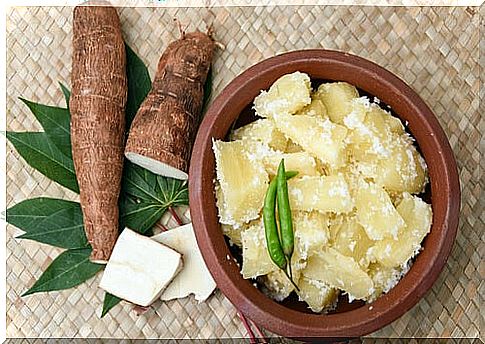
How is cassava consumed?
It is important to know that cassava or manioc must be peeled. In addition, it should always be eaten cooked, since when it is raw it contains toxins that are harmful to health.
- It can be prepared cooked or fried, as if it were a potato. It is served as a side or as a main meal.
- It can also be ground into flour and used in any recipe. Cassava is suitable for coeliacs because it does not contain gluten.
- As for the young cassava leaves, they are edible as long as they are cooked. Like cassava itself, raw can be toxic. The intake makes up for the lack of protein in the root (the most eaten part of the plant).
Medicinal properties of cassava or manioc
It is very important to clarify that, although we are talking about medicinal properties, cassava is not a super powerful food or capable of alleviating diseases. While it may provide some health benefits when consumed in moderation, that is not to say that it alone can alleviate ailments.
Therefore, it is important to assume these qualities of the vegetable as simple reasons to include it in a healthy and balanced eating plan. In this way, surely, you can contribute to well-being.
Helps improve digestion
Cassava is very easy to digest and, at the same time, provides dietary fiber. According to a publication in the Journal of Food Science and Technology , dietary fiber from food can help speed up the passage of food through the digestive system. In addition, it adds bulk to the stool and prevents problems such as constipation.

Supports the immune system
The nutrients contained in cassava serve as allies to strengthen the functions of the immune system. That is to say, including this food in the regular diet favors the prevention of infectious diseases, allergies and other conditions that are often given by having low defenses.
Among other things, cassava contains saponins, substances that, according to a study published in 2014, have potential as immunoadjuvants.
Helps promote bone health
As evidence shows, cassava makes a slight calcium intake. For this reason, its consumption is also related to better bone health. Calcium, according to a study published in the journal Nutrients , is essential for strengthening bones and preventing loss of bone density.
It is important to moderate the consumption of cassava
Due to its carbohydrate content, consuming too much cassava can contribute to weight gain. Therefore, it is a food that should be eaten in moderation. In addition, it should always be prepared cooked, since raw can be toxic.
Likewise, it must be taken into account that the evidence on its medicinal properties is still limited. Therefore, it should not be used as a remedy or treatment for health problems. It is only good to consume it as part of the diet, although in moderate amounts.
